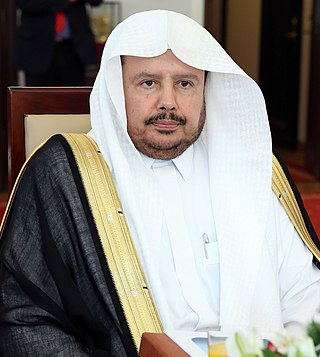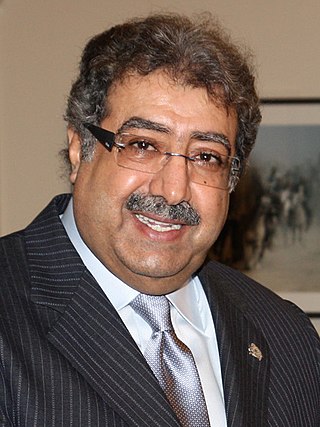Related Research Articles

The politics of Saudi Arabia takes place in the context of a unitary absolute monarchy, along traditional Islamic lines, where the King is both the head of state and government. Decisions are, to a large extent, made on the basis of consultation among the King, the Council of Ministers, Islamic scholars, tribal leaders and other traditional elites of the society. While some critics and Western columnists have accused the Saudi government of being totalitarian, several political scientists have regarded it as lacking features of totalitarianism, instead classifying it as an authoritarian state.

Fahd bin Abdulaziz Al Saud was King and Prime Minister of Saudi Arabia from 13 June 1982 until his death in 2005. Prior to his ascension, he was Crown Prince of Saudi Arabia from 1975 to 1982. He was the eighth son of King Abdulaziz, the founder of modern Saudi Arabia.

Nayef bin Abdulaziz Al Saud was the crown prince of Saudi Arabia and deputy prime minister from October 2011 and the minister of interior from October 1975 until his death in June 2012.

Ahmed bin Abdulaziz Al Saud is a member of House of Saud who served as deputy minister of interior from 1975 to 2012 and briefly as minister of interior in 2012. He was detained in March 2020 on the orders of his brother and nephew, King Salman and Crown Prince Mohammed bin Salman, respectively, and charged with treason.

Salman bin Abdulaziz Al Saud has been King of Saudi Arabia since 2015 and was Prime Minister of Saudi Arabia from 2015 to 2022. The 25th son of King Abdulaziz, the founder of Saudi Arabia, he assumed the throne on 23 January 2015. Prior to his accession, he was Crown Prince of Saudi Arabia from 18 June 2012 to 23 January 2015. Salman is the 3rd oldest living head of state and the oldest living monarch besides being the country's first head of state born after the unification of Saudi Arabia. He has a reported personal wealth of at least $18 billion, which makes him the third wealthiest royal in the world and one of the wealthiest individuals in the world. He was named the most powerful and influential Muslim and Arab leader in the world by the Muslim 500 in 2023.

Muqrin bin Abdulaziz Al Saud is a Saudi Arabian politician, businessman, and former military aviator who was briefly Crown Prince of Saudi Arabia from January to April 2015, during the first three months of his half-brother King Salman's reign. He is the 35th son of King Abdulaziz, born to Abdulaziz's Yemeni concubine Baraka. Since the death of Abdulaziz's 36th son Hamoud in 1994, Muqrin has been the youngest surviving son of the king.

Nawwaf bin Abdulaziz Al Saud was a Saudi Arabian businessman and politician. A member of the House of Saud, he became a close ally of King Abdullah. In different periods Prince Nawwaf held significant government posts, including the director of Saudi intelligence agency.

Women's rights in Saudi Arabia are a topic of concern and controversy internationally. Saudi women have experienced major legal rights reforms since 2017, after facing Wahhabism religious fundamentalist dominance dating from 1979.
The Qatif rape case is a much-publicized gang rape case. The victims were a Shia young woman from Qatif and her male companion, who were kidnapped and gang-raped by seven Saudi men in mid-2006. A Saudi Sharia court sentenced the perpetrators to varying sentences involving 100 to 1,000 lashes and imprisonment up to ten years for four of them. The court also sentenced the two victims to six months in prison and 90 lashes each for "being alone with a man who is not a relative" in a parked car. The appeals court doubled the victims' sentences in late 2007 as punishment for the heavy media coverage of the event in the international press regarding the treatment of women in the Kingdom of Saudi Arabia and Saudi judicial practices. In December 2007, the Saudi King Abdullah issued an official pardon for the two victims, citing his ultimate authority to revise "discretionary" punishments in accordance with the public good, although the pardon did not reflect any lack of confidence in the Saudi justice system or in the fairness of the verdicts.

Abdullah bin Abdulaziz Al Saud was King and Prime Minister of Saudi Arabia from 1 August 2005 until his death in 2015. Prior to his ascension, he was Crown Prince of Saudi Arabia since 13 June 1982. He was the tenth son of King Abdulaziz, the founder of Saudi Arabia.

Norah bint Abdullah Al Faiz, also spelled Noura Al Fayez, is the first woman to hold a cabinet-level office in Saudi Arabia. She was vice minister of education from 2009 to 2015.

Muhammad bin Nayef Al Saud, colloquially known by his initials MBN or MbN, is a former Saudi Arabian politician and businessman who served as the crown prince and first deputy prime minister of Saudi Arabia from 2015 to 2017 and as the minister of interior from 2012 to 2017.

Abdullah ibn Muhammad Al ash-Sheikh is the chairman of the Majlis ash-Shura of Saudi Arabia since February 2009. He was the minister of Justice from February 1992 to February 2009.

The legal system of Saudi Arabia is based on Sharia, Islamic law derived from the Qur'an and the Sunnah of the Islamic prophet Muhammad. The sources of Sharia also include Islamic scholarly consensus developed after Muhammad's death. Its interpretation by judges in Saudi Arabia is influenced by the medieval texts of the literalist Hanbali school of Islamic jurisprudence. Uniquely in the Muslim world, Sharia has been adopted by Saudi Arabia in an uncodified form. This, and the lack of judicial precedent, has resulted in considerable uncertainty in the scope and content of the country's laws. The government therefore announced its intention to codify Sharia in 2010, and, in 2018, a sourcebook of legal principles and precedents was published by the Saudi government. Sharia has also been supplemented by regulations issued by royal decree covering modern issues such as intellectual property and corporate law. Nevertheless, Sharia remains the primary source of law, especially in areas such as criminal, family, commercial and contract law, and the Qur'an and the Sunnah are declared to be the country's constitution. In the areas of land and energy law the extensive proprietorial rights of the Saudi state constitute a significant feature.
Mishaal bin Abdullah Al Saud is a Saudi prince, diplomat, and politician. Prince Mishaal is a son of King Abdullah. He served as the governor of Najran Province (2009–2013) and then as the governor of Mecca Province (2013–2015).

Faisal bin Abdullah Al Saud is a retired Saudi Arabian politician and businessman who served as the Saudi Arabian minister of education from 2009 to 2013 in the administration of King Abdullah, his maternal uncle and father-in-law. He is a member of the House of Saud.

Iyad bin Amin Madani is a Saudi politician who served in different cabinet posts. He was the secretary general of the Organisation of Islamic Cooperation from 2014 to November 2016. He was the first Saudi official to hold that position.

The judiciary of Saudi Arabia is a branch of the government of Saudi Arabia that interprets and applies the laws of Saudi Arabia. The legal system is based on the Islamic code of Sharia, with its judges and lawyers forming part of the country's religious leadership or ulama. There are also non-Sharia government tribunals which handle disputes relating to specific royal decrees. Final appeal from both Sharia courts and government tribunals is to the King of Saudi Arabia and all courts and tribunals follow Sharia rules of evidence and procedure.
Supreme Council of Magistracy of Saudi Arabia is a seven-eleven member council appointed by the King in the legal system of the Kingdom of Saudi Arabia. It supervises the lower courts of Saudi Arabia – overseeing judges' performances and new judicial appointments – but also provides "legal opinions, advises the King, and reviews sentences involving death, stoning, or amputation".. The Minister of Justice serves as the chief of the Council.

Dr. Walid bin Mohammed al-Samaani is a jurist and administrator who serves as the Justice Minister in the Government of Saudi Arabia. He was appointed in the first cabinet formed by King Salman bin Abdul-Aziz Al Saud after he assumed the throne on January 23, 2015.
References
- ↑ Cordesman, Anthony H. (2009). Saudi Arabia: National Security in a Troubled Region. p. 120. ISBN 978-0-313-38076-1 . Retrieved 19 September 2012.
- 1 2 "Changes in key agencies to boost reform: Experts". Arab News. 16 February 2009. Retrieved 19 September 2012.
- ↑ "King Abdullah makes major government appointment". Royal Embassy of Saudi Arabia, Washington D.C. 14 February 2009. Archived from the original on 12 June 2010. Retrieved 19 September 2012.
- ↑ "Tentative steps in Saudi Arabia: The king of Saudi Arabia shows some reformist credentials". The Economist. 17 February 2009. Retrieved 19 September 2011.
- ↑ Ramady, Mohamed A. (2010). The Saudi Arabian Economy: Policies, Achievements, and Challenges. p. 18. ISBN 978-1-4419-59874 . Retrieved 19 September 2012.
- ↑ "King reshuffles Supreme Judiciary Council and Ulema". Arab News. 15 January 2013. Retrieved 17 October 2023.